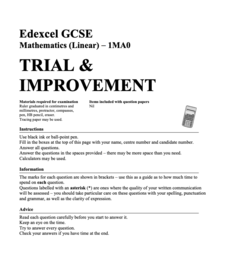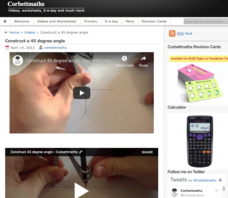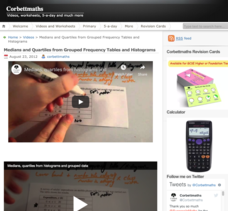Mathed Up!
Distance Time Graphs
If only there was a graph to show the distance traveled over a period of time. Given distance-time graphs, pupils read them to determine the answers to questions. Using the distance and time on a straight line, scholars calculate the...
Mathed Up!
Trial and Improvement
Try to find an estimate when the exact answer is not clear. Using the General Certificate of Secondary Education Math review resource, pupils learn how to find an estimate to a cubic equation. Class members use the trial-and-improvement...
Mathed Up!
Solving Equations
Use the same procedures, just with rational numbers. The resource builds upon scholars' ability to solve linear equations that involve rational numbers. Pupils solve one-step, two-step and multi-step equations in the review for the...
Mathed Up!
Percentages
Review a percentage of math skills. Designed to review for the General Certificate of Secondary Education Math assessment, the resource provides practice with a variety of percent problems. Items provide pupils problems ranging from...
CCSS Math Activities
Smarter Balanced Sample Items: High School Math – Claim 4
What is the appropriate model? Sample problems show the extent of the Smarter Balanced assessments Claim 4, Modeling and Data Analysis. Items provide pupils the opportunity to use mathematical modeling to arrive at a reasonable answer....
CCSS Math Activities
Smarter Balanced Sample Items: High School Math – Claim 2
Problem solve across the content standards. The presentation slides provide 19 sample items from the Smarter Balanced high school assessment. Items illustrate Claim 2, problem solving, of the test and are drawn from all the high school...
Corbett Maths
Median for a Frequency Table
Try to find the middle of a frequency table. Using a frequency table of ages, the video shows how to use a formula to determine the position of the median. The resource uses frequency tables with both even and odd numbers of data points.
Corbett Maths
Coordinates and Shapes
Where is the point? Given three points on the coordinate plane, the video walks through the steps to find the location of the fourth point to create a given special quadrilateral. The narrator first determines the coordinates of the...
Corbett Maths
Construct a 45 Degree Angle
Create a 45-degree angle without bisecting an angle. A video shows a method to construct a 45-degree angle without needing to bisect a right angle. By constructing an isosceles right triangle, the presenter constructs a 45-degree angle...
Corbett Maths
Construct a 30 Degree Angle
Split it down the middle. Using the tools of geometric construction, the video shows two different methods of constructing a 30-degree angle. The first method bisects an angle of an equilateral triangle. The second uses the diagonal of a...
Corbett Maths
Medians and Quartiles from Grouped Frequency Tables and Histograms
Determine medians within a group. Given data represented as a frequency table of grouped data, the video demonstrates finding an estimation for the median. After finding the group where the median resides, the presenter uses a formula to...
Corbett Maths
The Median
Find the one in the middle. An informative resource explains how to determine the median of a set of numbers. Using both even and odd numbers of data points, the video covers the process of finding the middle number. Worksheets provide...
Corbett Maths
The Range
Spread the data out on the range. The short video provides a definition of the range. Using a data set of five numbers, the resource calculates the range.
Corbett Maths
Angle Bisector
Cut it in half with a compass and straightedge! Using construction tools, a video shows how to create an angle bisector. The presenter points out what it means to bisect an angle in terms of the measure and distances from the sides of...
Corbett Maths
Constructing SSS Triangles
Creating a triangles is as easy as 5, 6, 7. Using a ruler and compass to measure off lengths, a short video shows how to construct a triangle with three specific side lengths. The example creates a triangle with side lengths of 5 cm, 6...
Corbett Maths
Enlargements with Negative Scale Factor
How will a scale factor affect a figure—negatively? Using a grid, the narrator of an engaging video performs a dilation with a negative scale factor. The presenter compares a positive scale factor with a negative scale factor to explain...
Corbett Maths
Constructing ASA Triangles
The narrator of a short video explains the steps in constructing a triangle given the measure of two angles and the length of the side between the angles. The resource provides opportunities for pupils to practice the skill with two...
Corbett Maths
Perpendicular from a Line to a Point
Take steps in the right direction. With a short demonstration, a video shows the steps to construct a perpendicular from a line to a point. Using a protractor, the narrator confirms the resulting construction is perpendicular, and then...
Corbett Maths
Perpendicular Through a Point on a Line
Use one construction to complete a second. The short video shows how to incorporate the steps of a perpendicular bisector to create a perpendicular to a point on a line. With their own straightedges and compasses, classmates then...
Corbett Maths
Perpendicular Bisector
Where should the statue be located? The resource explains how to use a compass and straight-edge to construct the perpendicular bisector of a line segment. Using an exam question, the narrator models how to solve an application problem...
Corbett Maths
Enlargements with Fractional Scale Factors
Enlargements make it bigger, right? A video shows viewers how to perform a basic dilation with a fractional scale factor. They learn how to use the scale factor to find the location of the transformed vertex by multiplying the horizontal...
Corbett Maths
Finding the Centre of Enlargement
Where did the transformation begin? Using a ruler, the narrator of a short presentation shows how to find the center of enlargement for transformed figures. Worksheets provide the class members an opportunity to practice the newly...
Corbett Maths
Describing Enlargements
What caused that to happen? Using three aspects, a video demonstrates how to describe an enlargement or dilation. The presenter counts the lengths of the sides to determine the scale factor and a ruler to find the center of dilation.
Corbett Maths
Enlargements
Count on the scale to enlarge a figure. The video shows how to create an enlargement given a scale factor and a center of enlargement. The presenter multiplies the vertical and horizontal distance by the scale factor to find the new...

























